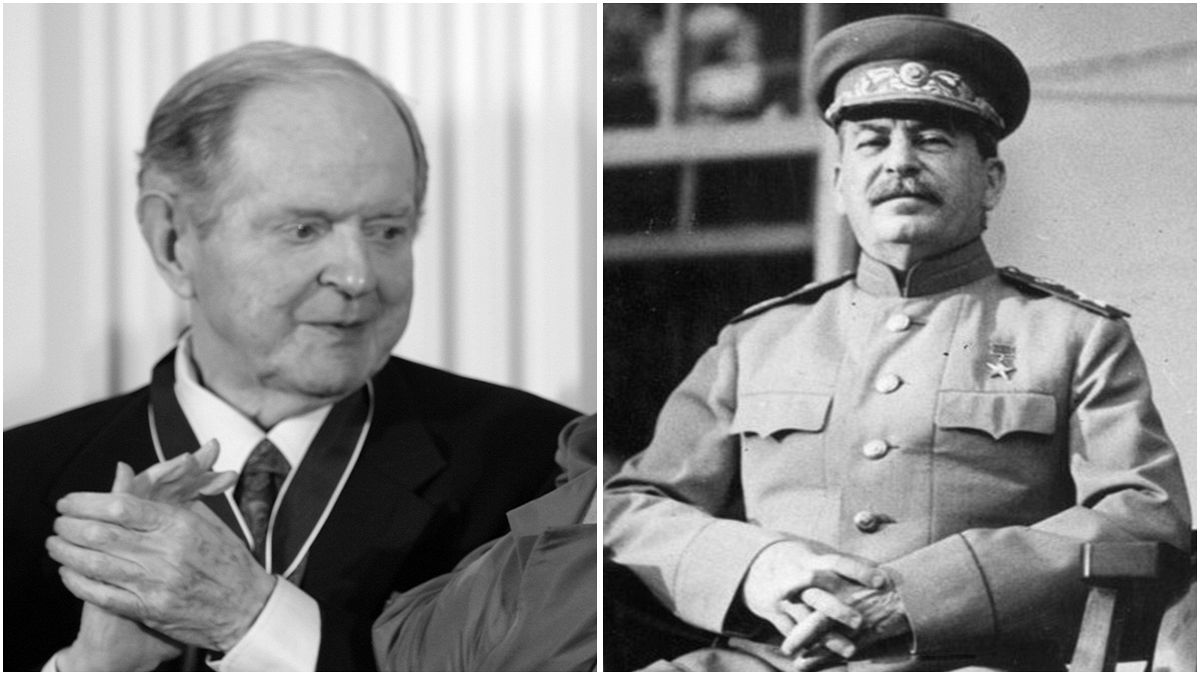Robert Conquest, a prominent Anglo-American historian, who documented many aspects of Stalin’s rule, has died aged 98 in California. He wrote poetry
Robert Conquest, a prominent Anglo-American historian, who documented many aspects of Stalin’s rule, has died aged 98 in California.
He wrote poetry, science fiction and love letters, but is best known as a chronicler of 1930s Soviet history. He authored over 20 historical works but is most famous for two: The Great Terror: Stalin’s Purge of the Thirties and The Harvest of Sorrow: Soviet Collectivization and the Terror-Famine.
The first book revealed many facts, previously unknown to Western readers, about the scale of Soviet purges. Published in 1968 Conquest’s meticulously researched book estimated that under Stalin’s rule 20 million people died in labour camps, perished in famines or were executed.
The latter told the story of man-made famine in 1932-33 which killed, according to various estimates, between 2.5 and 6 million Ukrainian peasants.
“The Great Terror” was written not just for narrow academic audiences but for a much wider readership. It sold millions of copies worldwide and changed common perceptions of the Stalinist regime. Not only was it supported by facts, it also presented memorable details which created a three-dimensional picture of Stalin’s persona. Conquest wrote how on a single day, 12 December 1937, Stalin approved death sentences on over 3,000 people and then went to the cinema.
The book was published in 1968, the year of Prague Spring when Soviet troops invaded Czechoslovakia in response to political liberalisation conducted by the reformist leader Alexander Dubcek. Soviet Union sympathisers and communist ideology revisionists were already having a hard time holding on to their beliefs in the face of unflattering reality. Conquest’s work served them another blow.
“The Great Terror” also changed the accepted outlook on World War II and showed exactly how the purges within the highest echelons of the Soviet Army jeopardised the USSR’s fighting capability after Nazi Germany invaded in June 1941.
After the Soviet archives were opened Robert Conquest published an updated version of his work in 1990, calling it The Great Terror: A Reassessment. He may have revised the figures of human losses but the bulk of his argument remained the same.
Rumour has it that when Conquest asked his friend, British writer Kinglsey Amis, for an alternative title, the latter suggested: “I told you so, you fools.”
![]() The 1932-33 famine remains a painful memory for Ukraine
The 1932-33 famine remains a painful memory for Ukraine
His other major work was “The Harvest of Sorrow”, published in 1986, which described for the first time to a large audience the tragedy of the famine, brought on by Bolshevik collectivisation of Ukrainian countryside in the 1930s. Conquest was one of the first scholars to argue that it was a deliberate effort by the Stalinist regime to starve as many Ukrainians as possible.
Using evidence gathered by a Welsh journalist Gareth Jones – who had travelled through famine-stricken Ukraine in 1933 – Conquest was able to describe what happened. He wrote about extreme starvation and cannibalism.
Incidentally, the issue of the famine (known in Ukraine as “Holodomor”) remains a contentious one: many Russian historians argue that it was caused partly by Moscow’s collectivisation policies, but had affected not only Ukraine but also parts of Russia, Belarus and Kazakhstan.
Robert Conquest attempted to provide an unaffected voice which described methodically and without emotion, the extraordinary scale of life loss brought on by the Soviet purges and famines. At the height of repressions in 1937-38, Conquest wrote, hundreds of thousands of people were shot in a matter of months.
Robert Conquest’s books contributed to the debate on Stalin’s role in history – a debate which remains open to this present day with many in Russia reassessing the Soviet leader’s legacy with nostalgia.
